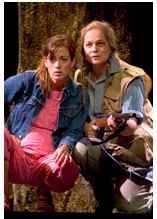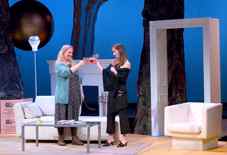

"WILDLIFE"
by Victor Lodato
|
|
TheatreFest -
Montclair, NJ
Director: John Wooten
Star-Ledger
Mind warps:
Montclair's TheatreFest finds an eerily pleasing winner in 'Wildlife'
Tuesday,
July 20, 2004
BY
PETER FILICHIA
It's
a play that's savage, ferocious and turbulent.
Then again, it
should be -- given that its title is "Wildlife."
Victor Lodato's
fascinating new work, which won the Regional Playwriting Competition
offered annually by TheatreFest, is getting an equally fascinating
production on the campus of Montclair State University.
At the outset,
"Wildlife" seems to have an all-too-familiar premise, one that
"Green Acres" ran into the ground ages ago. Manhattanites
Larry and Carol List -- he's a conceptual artist, she's a socialite --
decide to get away from it all. As in that wan TV series, the husband
has the idea to move to an isolated spot. The conflict begins when Larry
wants to start a fire in the fireplace, and Carol says it would make
such a mess.
Suddenly the script
takes a turn into Stephen King territory. Maggie and Jack, the neighbors
up the road, seem scarier than the city dwellers the Lists left behind.
Maggie enters after Carol is frightened by wild animals at her front
door. "Brazen, ain't they?" Maggie says cheerfully -- as she
even more brazenly barges into the house and makes herself at home.
She's brought mushrooms as a housewarming gift, and Carol hesitates to
eat them, fearing they're poisonous.
Carol tries to
escape by feigning a headache, and Maggie is all-too- willing to massage
her temples. "We're going to get along famously," says Maggie
-- and Carol has to wonder if she'll be famous for ending up the victim
of a grisly crime.
But that's where
similarities to "Green Acres" end. Lodato eventually reveals
what prompted the couple to abandon the city. No matter how far they go,
they'll never flee the truly tragic and painful experience that spurred
the move. When the secret is out, it's enough to make even the most
complacent theatergoer gasp in horror.
More contradictions
follow. Carol becomes pregnant and takes an illicit drug, raising the
question of whether she wants the baby. Lodato gives a good reason why
she might not.
As clever as the
play turns out to be, John J. Wooten's direction matches it. The
beginning of the show suggests the audience will see overwrought
performances all night long. Greg McFadden appears too glib and
superficial as Larry, and Aidan Sullivan's Carol seems as nervous as the
love child of Woody Allen and Paul Lynde. But in the second act, when
the couple is seen in happier times, McFadden and Sullivan each comes
across as happy, self-actualized people. Only then does their erratic
behavior in the first act make sense.
Wendy
Barrie-Wilson, who was so superb as Amanda in "The Glass
Menagerie" at the Shakespeare Theatre of New Jersey last summer,
has a self-assured, salt-of- the-earth cheeriness as Maggie. She even
seems to be complimenting her husband, Jack, when she notes, "He's
never hit me in front of my babies." He's menacingly played by
Stephen Bradbury, who makes his few stage moments count.
The play succeeds
because Lodato has a bit of the conceptual artist in him. Certainly his
plot twist shows a writer who eschews convention. Granted, he could use
a stronger ending, but "Wildlife" emerges as the most
haunting, original and satisfying work that TheatreFest has found in the
six years it's offered the Regional Playwriting Contest.
Honing the playwright’s craft
The Montclair Times, NJ
Thursday, July 22, 2004
TheatreFest,
on the campus of Montclair State University, has mounted a full-scale
professional production of “Wildlife” by Victor Lodato, the winner of
this year’s Regional Playwriting Festival. A solid team of actors,
director, set designer and technicians have given the young writer and the
TheatreFest audience a clear look at his script which is commendably
ambitious, mostly interesting but also something like a variety pack of
playwriting styles.
In “Wildlife,” a young Manhattan couple moves to a
new home, deep in the woods of upstate New York. Lewis is a successful
conceptual artist who does “installations.” Carol, his wife, doesn’t
do much of anything: “I’m not un-employed…I don’t have to work.”
At the beginning of the play, they seem a normal enough couple, although
Carol is having trouble adjusting to quiet, near isolated, country living.
The play itself seems to be settling into a naturalistic, domestic comedy
about a clash of lifestyles. Then Carol breaks the fourth wall to deliver
a long, rambling monologue directly to the audience about buying a purse
that looks like a briefcase. Huh?
In the next scene, Maggie, their robust, rustic
down-home neighbor, comes to visit. She seems to be the embodiment of the
inevitable culture clash and possibly the new friend and mentor who
will….but wait…there’s a hint of menace drifting around Maggie
and…that mysterious cold draft Carol complained about in the first
scene, was it just cold air or …a… symbol? And what of the silver urn
on the mantle that Carol and Lewis are so touchy about, and the “baby”
mentions when there’s no child in sight, and Maggie dropping a phrase
like “the death of a loved one” into the conversation and — hey!
Forget about Virginia Wolff, “Who’s afraid of what’s in the urn?”
Lodato is a talented young writer who hasn’t yet
found his own voice so the disparities in the script are understandable.
That’s why he can be both original and derivative and why “Wildlife”
isn’t like any other play you’ve ever seen but at the same time, here
and there, pretty much like Albee and Beckett, a little bit like Ionesco
and an awful lot like Stephan King. I even hear a trace of Noel Coward in
the self-absorbed monologues that Lewis delivers.
The monologues and scenes can be both compelling and
entertaining but they don’t fit together into a satisfactory whole. And
there are times when we find ourselves wondering, “What is this supposed
to mean?” or asking the even more problematic question, “Is this
supposed to be serious or funny?”
For instance, in the last 10 or 15 minutes of the
play, one of the main characters flips out, mixes a dead infant’s ashes
with salad dressing, paints his face with it, goes into a catatonic state,
finds himself inside a tree trunk singing “Sesame Street,” is struck
by lightning but survives just long enough to be smothered with a pillow
while resting on his own couch. (And you thought you had a bad day!) The
problem is that the audience isn’t sure whether all this is over-the-top
camp that should be tickling their funny bone or Gothic horror that should
be curdling their blood.
Having a tentative audience 10 minutes before the
final curtain is obviously not a good thing for a writer, but get-ting
your script on stage in front of an audience, so you can find that out, is
one of the very good things about TheatreFest. The Regional Playwriting
Festival gives the playwright a fresh look at his material. He sees what
works on stage and what doesn’t, what has to be cut, or rewritten; he
experiences an audience experiencing his play, and learns what he has to
do next to make it better.
The biggest contribution to Victor Lodato’s growth as a playwright comes from the clear-cut work of his director and cast. Greg McFadden and Aidan Sullivan, as Lewis and Carol, play their characters fully, from moment to moment, scene to scene, and make it easy for the writer to spot the flaws and fix the inconsistencies. Wendy Barrie-Wilson creates a solidly believable Maggie and Stephan Bradbury contributes as Maggie’s occasionally abusive husband. John J Wooten’s direction is straightforward and intelligent. He takes full advantage of J. Wiese’s impressive set, moving his cast up, down and around the space at a nice pace with some subtle staging touches.